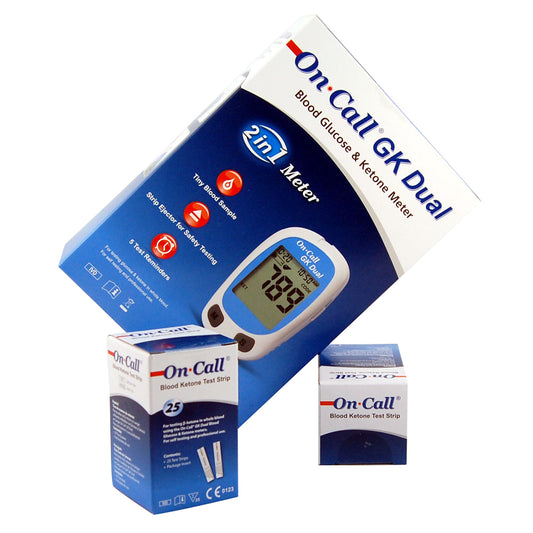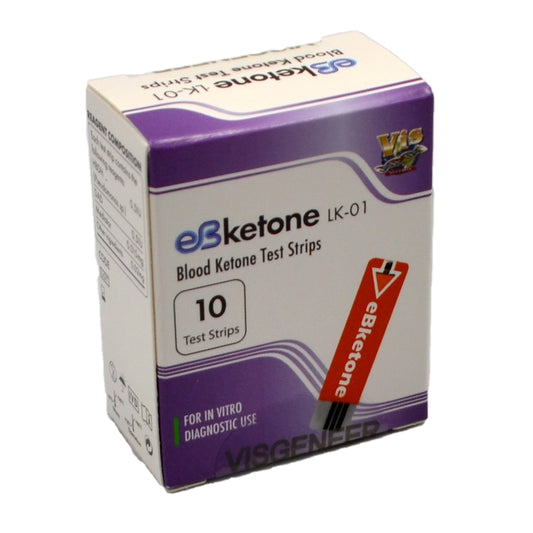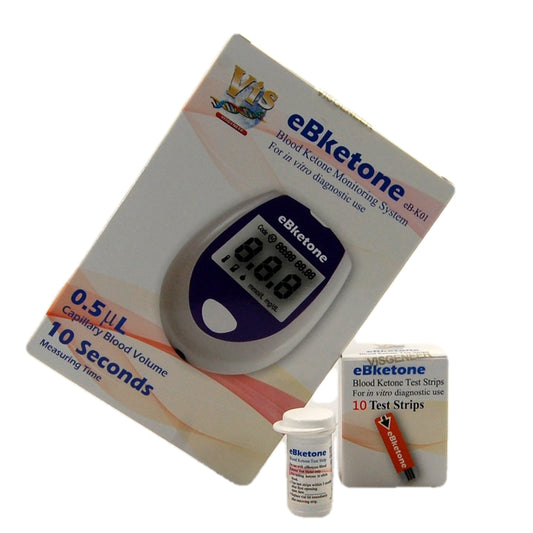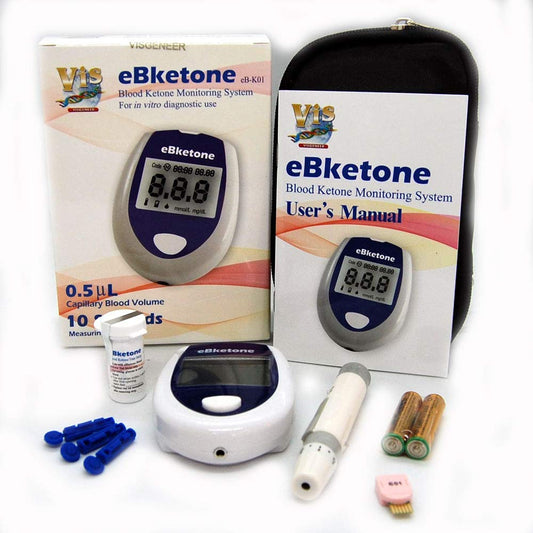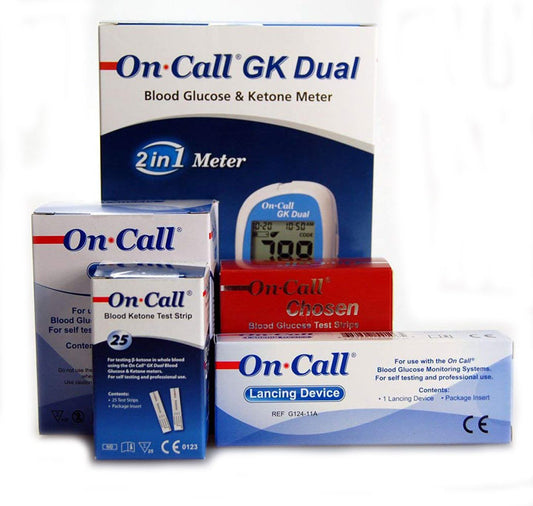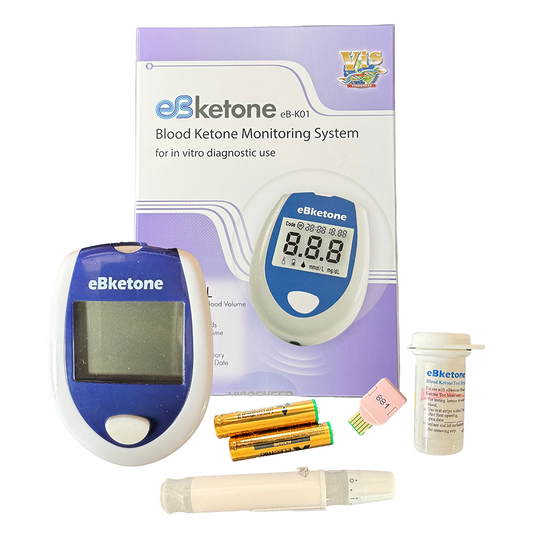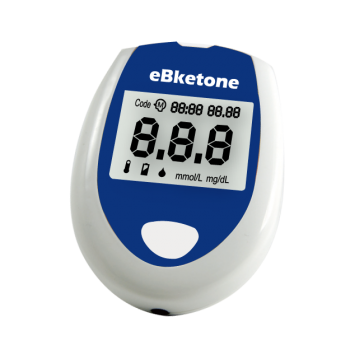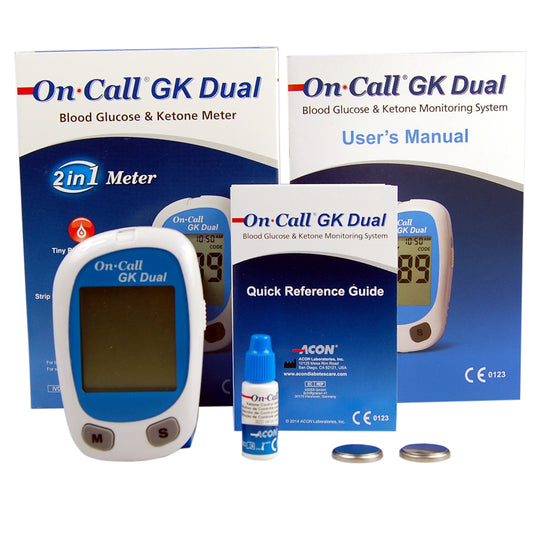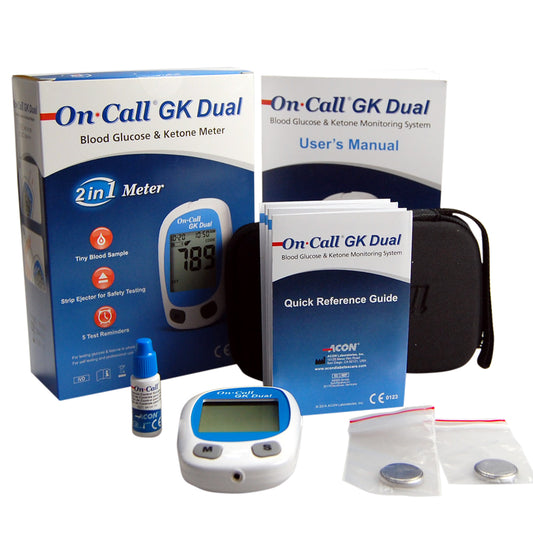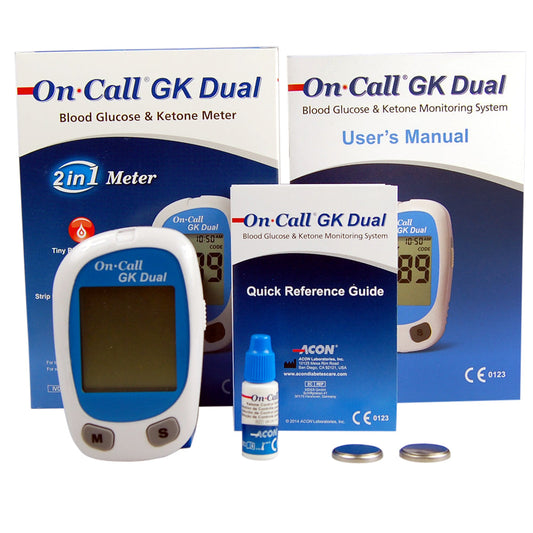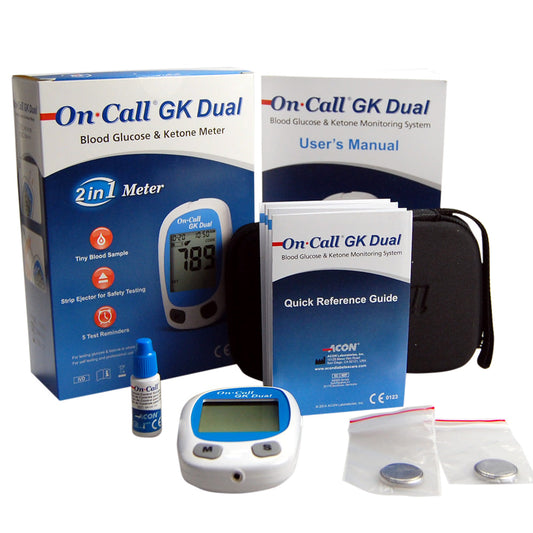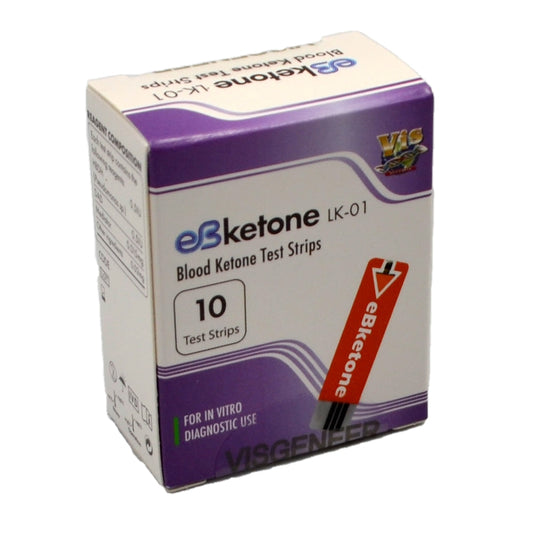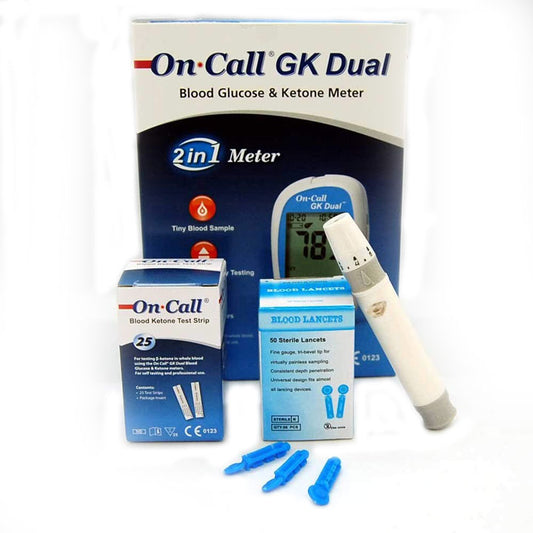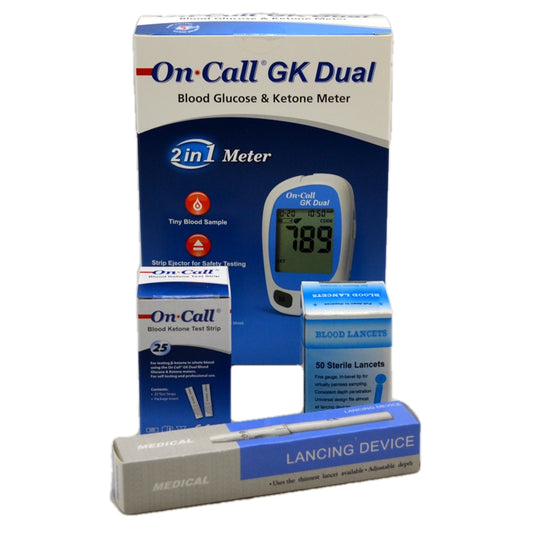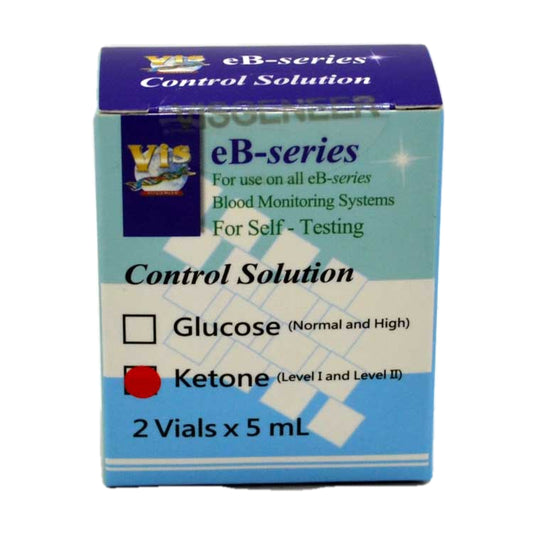Collection: Ketone Meters and Ketone Test Strips
Take control of your health with a reliable blood ketone meter from ValueMed. Browse our collection, read customer reviews, and find the perfect ketone meter to suit your needs. For any questions or personalised recommendations, don’t hesitate to contact our customer support team.
-
25 On Call Blood Ketone Test Strips
9 reviewsRegular price From £19.95 GBPRegular priceUnit price / per -
FREE KETONE Meter when you buy 50 On Call Blood Ketone Strips ( 2 x 25 test strips)
10 reviewsRegular price £39.99 GBPRegular priceUnit price / per£61.97 GBPSale price £39.99 GBPSale -
50 ON CALL CHOSEN Blood Glucose Test Strips
1 reviewRegular price From £17.99 GBPRegular priceUnit price / per -
eBketone Blood Ketone Test Strips
No reviewsRegular price From £17.95 GBPRegular priceUnit price / per£33.90 GBPSale price From £17.95 GBPSale -
FREE ebketone KETONE Meter when you buy an 20 eBketone Blood Ketone Strips here
7 reviewsRegular price £33.90 GBPRegular priceUnit price / per -
On-Call Dual Glucose & Ketone Meter + 25 Blood Ketone Test Strips + 50 Blood Glucose Test Strips + 100 Lancets & Auto-lancer
No reviewsRegular price £59.00 GBPRegular priceUnit price / per -
eBketone Blood Ketone Meter
6 reviewsRegular price From £24.99 GBPRegular priceUnit price / per£29.99 GBPSale price From £24.99 GBPSale -
3 x On Call Chosen + 6 x On Call Ketone Test Strips Bundle
2 reviewsRegular price £148.46 GBPRegular priceUnit price / per£173.67 GBPSale price £148.46 GBPSale -
On Call GK Dual Blood Glucose and Ketone Meter
2 reviewsRegular price From £18.99 GBPRegular priceUnit price / per -
Free Ketone Meter-Free On Call GK Dual Blood Ketone Meter When You Buy 25 On Call Ketone Test Strips + 100 On Call Lancets + On Call Auto Lancing Lancing Device
1 reviewRegular price £29.87 GBPRegular priceUnit price / per£51.86 GBPSale price £29.87 GBPSale -
40 eBketone Blood Ketone Test Strips
1 reviewRegular price £60.99 GBPRegular priceUnit price / per£67.80 GBPSale price £60.99 GBPSale -
On Call GK ketone meter 25 Ketone test strips Lancer+Lancets bundle starter pack displays in mmol/L
No reviewsRegular price £45.00 GBPRegular priceUnit price / per -
eBketone Vet Blood Ketone Test Strips
No reviewsRegular price From £24.99 GBPRegular priceUnit price / per£49.98 GBPSale price From £24.99 GBPSale -
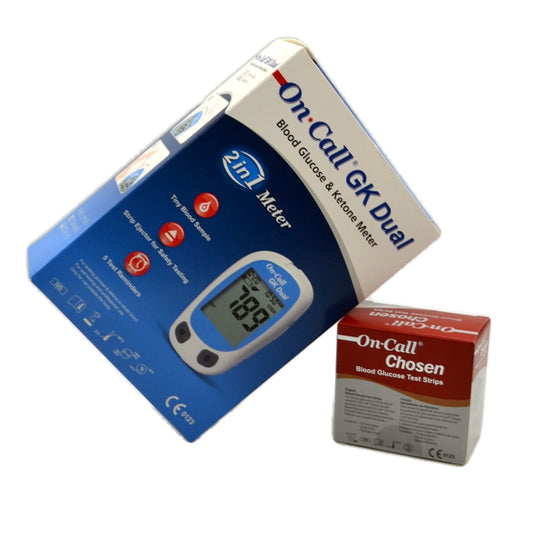
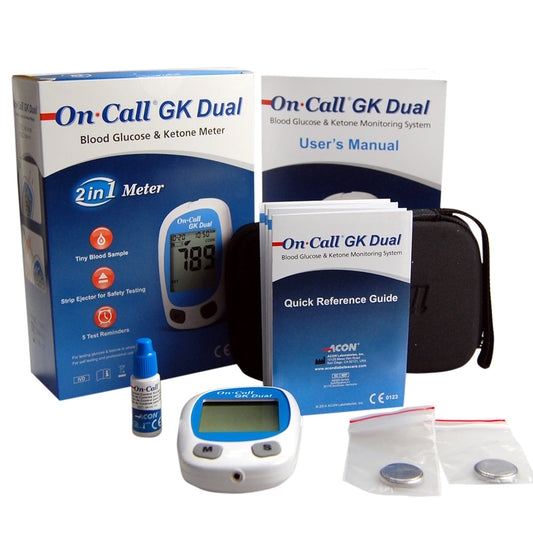
FREE Gluocose Meter when you buy 100 On Call Chosen Blood Glucose Test Strips ( 2 x 50 test strips)
No reviewsRegular price £35.98 GBPRegular priceUnit price / per£57.97 GBPSale price £35.98 GBPSale -
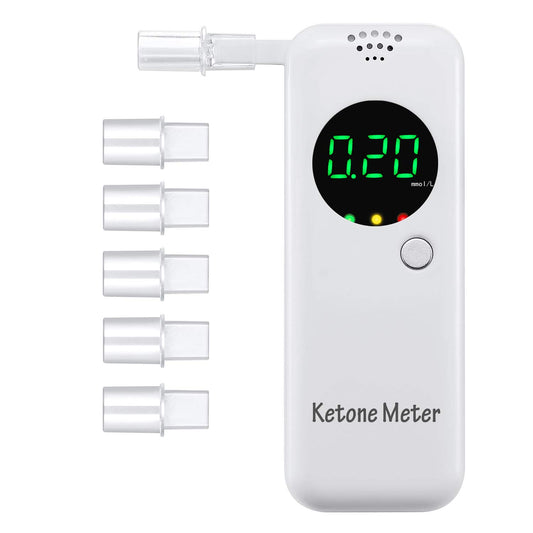
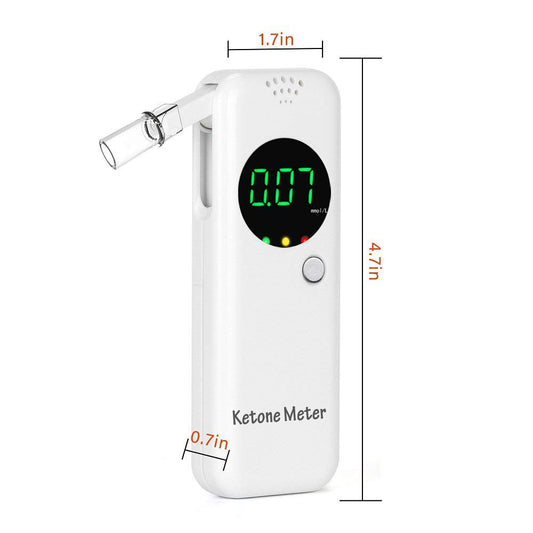 Sold out
Sold outKetone Breath Meter
6 reviewsRegular price £29.95 GBPRegular priceUnit price / per£43.99 GBPSale price £29.95 GBPSold out -
eBketone Blood Ketone Control Solution
No reviewsRegular price £9.99 GBPRegular priceUnit price / per£9.95 GBPSale price £9.99 GBPSold out
Blood ketone meters, ketone test strips and breath ketone levels monitoring
A blood ketone meter is always going to give far more accurate readings than a breath ketone meter. A breath ketone meter is a useful tool, to see whether or not you are in ketosis, or to use if you are not comfortable with doing finger prick blood ketone levels.
We have several free blood ketone meter offers on currently when you buy blood ketone test strips.
Frequently asked questions about using a blood ketone meter
Collapsible content
What is blood ketone testing?
Blood ketone testing measures beta-hydroxybutyrate (BHB), the most reliable ketone body in the bloodstream. It is used by keto dieters, athletes, and diabetics to monitor ketosis and metabolic health.
What time of day are is your blood ketone level the highest?
For people following a ketogenic diet, blood ketone levels often show diurnal variations with levels of ketones in the blood being the highest first thing in the morning after fasting overnight. . Many individuals experience higher ketone levels in the morning after an overnight fast, as the body has been in a state of fasting during sleep. This period of fasting typically leads to increased production of ketones by the liver.
However, it's important to note that individual responses can vary. Factors such as diet, activity level, and overall metabolic health can influence when someone might experience peak ketone levels. Additionally, the primary goal of a ketogenic diet is not necessarily to maximise blood ketone levels but to achieve and maintain a state of ketosis, where the body is using ketones as a primary source of energy.
How do I use a blood ketone meter?
- Wash hands and dry them completely.
- Insert a ketone test strip into the meter.
- Prick your fingertip with the lancing device.
- Place a small drop of blood onto the test strip.
- Wait for the meter to display your ketone reading.
It is always important to read the instructions before you start as different ketone meter instructions may vary slightly.
Do ketone levels go up and down throughout the day?
Yes, ketone levels can fluctuate throughout the day based on various factors such as dietary choices, physical activity, and the timing, type and size of meals. Here are some reasons for fluctuations in ketone levels:
- Dietary intake: The primary driver of ketone production is the restriction of carbohydrates in the diet. When carbohydrate intake is low, the body starts breaking down fats into ketones for energy. Therefore, the type and amount of food you eat, particularly the carbohydrate content, can influence ketone levels.
- Fasting and time of day: Ketone levels are often higher in the morning due to the overnight fasting period. During sleep, the body relies on stored energy, including fat, leading to increased ketone production.
- Physical activity: Exercise can impact ketone levels. Intense physical activity may temporarily reduce ketone levels because the body prefers to use glucose for immediate energy during high-intensity exercise. However, regular physical activity can contribute to overall fat metabolism and ketone production over time.
- Individual variability: Each person's body responds differently to dietary changes and fasting. Some individuals may naturally experience higher ketone levels, while others may have lower levels for similar dietary practices.
- Hydration and electrolytes: Ketone levels can be affected by hydration status and electrolyte balance. Dehydration can lead to a concentration of ketones in the blood, potentially resulting in higher ketone readings.
Can you use a lancet without an auto lancing device?
A lancet can be used alone or with a lancing device. Many people find it easier to obtain a finger prick blood sample if they use the lancet in a lancing device.
Most of our meters are supplied with starter packs of lancets and some with safety lancets. We suggest you continue to use the same lancets recommended by the manufacturer if possible. If you are struggling to get adequate samples move to a thicker lance, ie 21g is thicker than 28g or 30g (the thinnest)
How is blood ketone testing different from urine ketone testing?
- Blood ketone tests measure BHB, the primary ketone used for energy.
- Urine ketone strips detect acetoacetate, which may decline as you become keto-adapted.
- Blood testing provides more accurate, real-time ketosis tracking.
How often should I test my blood ketones?
- Keto dieters: Once a day or a few times per week.
- Athletes & biohackers: Before and after workouts or meals.
- Diabetics: As advised by a doctor, especially if blood sugar is high.
What is the best time to test blood ketones?
- Morning (fasted) – Gives a baseline reading.
- Before meals – Shows if you're maintaining ketosis.
- After eating – Helps track food impact on ketones.
- Post-exercise – Can indicate fat-burning efficiency.
Why are my blood ketone levels low despite eating keto?
- Your body may be efficiently using ketones for fuel rather than accumulating them in the blood.
- You may be eating too much protein, which can be converted into glucose.
- If you're new to keto, your body may still be adjusting.
Can hydration affect blood ketone levels?
Hydration primarily affects urine ketone tests. Blood ketone levels remain relatively stable regardless of fluid intake.
Hydration can have some effect on blood ketone levels, although it's less direct than with urine ketones. Here's why:
- Dilution Effect: In a well-hydrated state, blood volume increases, which can slightly reduce ketone concentration (though not as dramatically as urine ketones).
- Fat metabolism influence: Dehydration may increase stress hormones like cortisol, which can lead to a temporary rise in blood sugar, potentially lowering ketone production.
- Liver function: Hydration supports liver function, which is crucial for producing ketones from fat. Dehydration could slow ketone production.
So, while hydration doesn't directly "wash out" blood ketones like it does in urine, it can still impact ketone production and metabolism.
Do high blood ketones mean I’m burning more fat?
Not necessarily. Fat loss depends on caloric intake and energy expenditure, not just high ketone levels. Moderate ketosis (1.5–3.0 mmol/L) is sufficient for fat-burning.
Can diabetics use blood ketone testing?
Yes. Blood ketone testing is important for diabetics, especially those with Type 1 diabetes, to detect diabetic ketoacidosis (DKA). If ketones are high and blood sugar is elevated, seek medical help immediately.
Do I need to be in deep ketosis for weight loss?
Not necessarily. Mild to moderate ketosis (0.5 – 1.5 mmol/L) is often enough for fat burning. Weight loss depends on lots of factors including caloric intake, activity levels, and metabolic health, not just ketone levels.
How long does it take to show ketones on a keto diet?
It does vary between individuals but most people start producing ketones within 2–4 days of strict carb restriction. If you don’t see results within a week, you may need to adjust your macros.
Can exercise affect my ketone readings?
Yes. After a workout, ketone levels may temporarily drop as your body burns them for energy. Testing a few hours later may show higher levels again.
How does intermittent fasting affect blood ketone levels?
Intermittent fasting (IF) naturally increases blood ketones as your body switches from burning glucose to burning fat for fuel. The longer you fast, the higher your ketone levels tend to rise, typically reaching nutritional ketosis (0.5–3.0 mmol/L) after 12–24 hours.
When should I test my blood ketones while fasting?
- Morning (fasted state): Gives a baseline ketone level.
- Midday (after several fasting hours): Shows how ketosis is progressing.
- Before breaking your fast: Helps determine peak ketone levels.
- Post-meal: Checks how certain foods affect ketosis.
What blood ketone levels should I expect during intermittent fasting?
- 0.5 – 1.0 mmol/L – Light ketosis, common after 12+ hours of fasting.
- 1.0 – 3.0 mmol/L – Deeper ketosis, seen in 16–24+ hour fasts.
- 3.0 – 5.0 mmol/L – Common in extended fasts (48+ hours) but not necessary for benefits.
Why do my ketone levels fluctuate during fasting?
Ketone levels change based on:
- Time of day – Often lower in the morning, higher in the evening.
- Activity levels – Exercise can temporarily lower ketones as they are used for fuel.
- Hormones & metabolism – Insulin, cortisol, and other hormones influence ketone production.
- Hydration-your level of hydration can affect your ketone levels, but this is not as pronounced as with urine ketone testing.
How long does it take to enter ketosis while fasting?
Most people start producing ketones within 12–16 hours of fasting.



